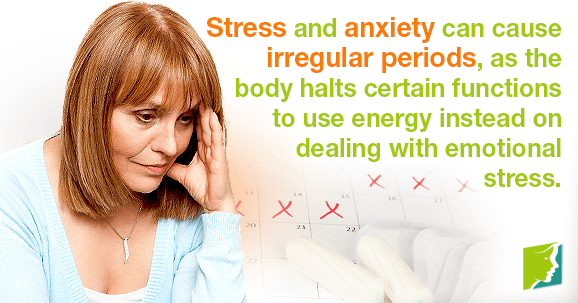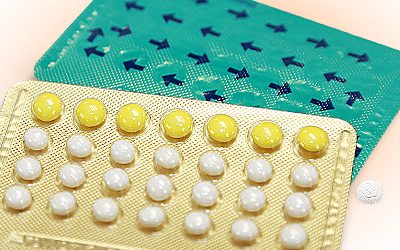A woman's menstrual cycle is intrinsically linked with her body's well-being and condition. During her childbearing years, the average woman's cycle is comprised of 28 days, with bleeding known as a period occurring for two to five days. However, middle-aged women are likely to experience irregularities from the common cycle, including sporadic, infrequent, and heavy periods. The primary cause for this is menopause, when the body's hormone production shifts in preparation for periods stopping altogether, but there are other influencing factors that can trigger irregular periods for women in their forties and fifties.
Hormonal Changes
The hormones that dictate the regularity of the menstrual cycle are estrogen and progesterone. When a woman enters middle age, production of these hormones declines as the body prepares to stop periods altogether. As a result of hormonal imbalances, periods are likely to occur less frequently, and bleeding is usually heavier and more painful when periods do occur. This symptom can last for up to ten years with increasing amounts of time between periods. Menopause is understood to have taken place when a period has not occurred for over a year.
Diet
Extreme weight loss can cause irregular periods, especially when this is paired with excessive exercise. Lack of nutrients, minerals, and sustenance during crash diets or after a large percentage of body weight has been shed quickly can cause periods to become irregular or stop altogether.
Stress
Emotional strain is likely to affect the regularity of the menstrual cycle. A significant change, such as traveling or moving to a new house, might temporarily cause periods to become irregular. Stress, grief, or anxiety can also cause irregular periods, as the body halts certain functions to use energy instead on dealing with emotional stress. Anxieties about other woes of middle-age, such as a crisis of identity, upset over children leaving home, and distress over other menopause symptoms, can add to stress levels.
Contraception
Your choice of contraception may also inhibit regular menstruation at any age, but this is all the more likely during middle age due to fluctuating hormone levels. Internal contraceptives, such as the pill, implant, and injection, are usually hormone-based, which can affect the activity of estrogen and progesterone and make periods more or less frequent.
Other Conditions
At any age, irregular periods may be associated with other conditions. These include:
Uterine fibroids. Fibroids are benign (i.e., non-cancerous) tumors that grow in and around the wall of the uterus. These can cause painful, irregular periods, and, in extreme cases, infertility or multiple miscarriages.
Endometriosis. Endometriosis occurs when parts of the uterus wall lining embed onto other parts of the reproductive area and continue to shed, causing inflammation, extreme pain, and infertility. Inability to become pregnant, pain when passing stools and urinating, depression, tiredness, and pain after sexual intercourse alongside irregular periods may all be suggestive of endometriosis.
Anemia. Anemia is a common blood disorder where, due to red blood cell deficiencies, only a limited supply of oxygen can be carried to organ and muscle tissues. Irregular periods are symptomatic of anemia, and other symptoms include jaundice, tiredness, depression, and hair loss.
Dealing with irregular periods can be frustrating for women approaching menopause; often, these years are plagued with various other physical and emotional symptoms, so unpredictable, heavy periods are just another nuisance to deal with. Being prepared for irregular periods in middle-age by carrying plenty of sanitary wear and learning effective pain management techniques is often helpful for coping with irregular periods and minimizing their impact.
Sources
- National Health Service UK. (2013). Periods, Irregular - Causes. Retrieved June 5, 2014, from http://www.nhs.uk/Conditions/Periods-irregular/Pages/Causes.aspx
- National Health Service UK. (2013). Periods, Irregular - Treatment. Retrieved June 5, 2014, from http://www.nhs.uk/Conditions/Periods-irregular/Pages/Treatment.aspx
- National Institutes of Health. (2014). Menstruation. Retrieved June 5, 2014, from http://www.nlm.nih.gov/medlineplus/menstruation.html
- National Institutes of Health. (2014). Uterine fibroids. Retrieved June 5, 2014, from http://www.nlm.nih.gov/medlineplus/uterinefibroids.html
- Office on Women's Health. (2012). Anemia fact sheet. Retrieved June 5, 2014, from http://womenshealth.gov/publications/our-publications/fact-sheet/anemia.html
- Office on Women's Health. (2012). Endometriosis fact sheet. Retrieved June 5, 2014, from http://womenshealth.gov/publications/our-publications/fact-sheet/endometriosis.html
- The Ohio State University. (n.d.). Perimenopause. Retrieved June 5, 2014, from http://medicalcenter.osu.edu/patientcare/healthcare_services/womens_health/menopause/perimenopause/Pages/index.aspx
- University of Chicago Medicine. (n.d.). Overview of Anemia. Retrieved June 5, 2014, from http://www.uchospitals.edu/online-library/content=P00078




